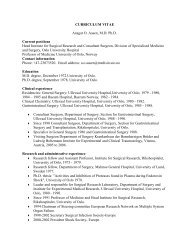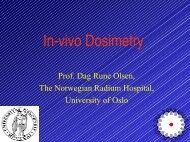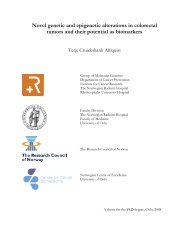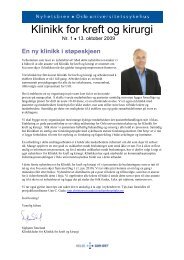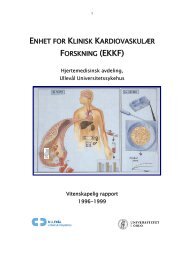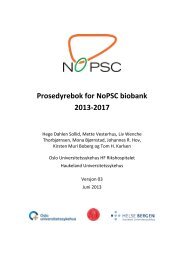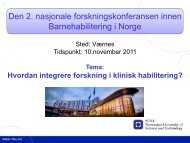Preface - Ous-research.no
Preface - Ous-research.no
Preface - Ous-research.no
You also want an ePaper? Increase the reach of your titles
YUMPU automatically turns print PDFs into web optimized ePapers that Google loves.
Transplantation and Malignancy<br />
Leader:<br />
Aksel Foss, Professor, MD, PhD, MHA, FEBS (OUH/UiO)<br />
Scientific staff:<br />
Svein Dueland, MD, PhD (OUH)<br />
Morten Hagness MD, PhD-student (SENRHA)<br />
Einar Martin Aandahl, MD, PhD (OUH)<br />
Tormod Lund, MD, PhD (Sørlandet Hospital, Arendal)<br />
Marit Andersen, MSc, PhD (OUH)<br />
Pål-Dag Line, MD, PhD (OUH)<br />
Kai Hansen, MNu, Coordinator (OUH)<br />
Background<br />
Organ transplantation requires lifelong immu<strong>no</strong>suppression.<br />
A side effect is increased post-transplant de <strong>no</strong>vo<br />
malignancy. During the last decades, the effectiveness of<br />
standard immu<strong>no</strong>suppressants in allograft transplantation<br />
has improved and so has the incidence of de <strong>no</strong>vo cancer. A<br />
recent study of 905 recipients of transplanted hearts, lungs,<br />
or both has shown a 7.1 times increase in de <strong>no</strong>vo cancers<br />
compared to the general population. Cancer-related death<br />
following transplantation is increasing and accounts for 13%<br />
of post transplant mortality.<br />
Regulatory T cells (T regs) maintain self-tolerance to autoantigens<br />
and are involved in the pathogenesis of various<br />
clinical conditions such as autoimmune diseases, chronic<br />
viral infections and cancer. T regs appear more frequently<br />
in peripheral blood lymphocytes of cancer patients than<br />
healthy controls and interestingly, it seems that high levels<br />
of T-regs are a prerequisite for allograft tolerance following<br />
transplantation. By manipulation of the interaction between<br />
CD4+ CD25+ T regs and dendritic cells, it may become<br />
possible to influence host offence and defense in cancer<br />
and organ transplantation. In these aspects it is of particular<br />
interest that immu<strong>no</strong>suppressive drugs used in transplantation<br />
have both an anti-rejection and anti-neoplastic activity.<br />
Rapamycin (Sirolimus, Rapamune®) is an established drug<br />
for prevention allograft rejection by blocking the intracellular<br />
pathway complex mTOR. It also appears that a Sirolimus<br />
based immu<strong>no</strong>suppression protocol has beneficial effects<br />
on tumor recurrence and survival with an acceptable rate<br />
of rejection and toxicity in liver transplanted HCC patients.<br />
Rapamycin is a potent VEGF antagonist showing significant<br />
anti angiogeneic effects in addition to a direct inhibitory effect<br />
on tumor growth and proliferation. The drug has shown<br />
clinical effect and objective x-ray responses and stabilization<br />
of disease in different types of cancer, such as advanced breast<br />
and renal cancer that has previously progressed on other<br />
treatments. Accordingly, rapamycin is an effective anticancer<br />
drug in addition to its immu<strong>no</strong>suppressive effects.<br />
This supports the use of the drug for patients transplanted<br />
for cancer and in patients with de <strong>no</strong>vo post transplant<br />
malignancy.<br />
In 2006 we acquired an ethical approval (S-05409 Regional<br />
Ethics Committee, Helse Sor-Ost) for a clinical pilot study<br />
(SECA-study) to investigate liver transplantation (Ltx) as<br />
treatment option for selected patients with <strong>no</strong>n-resectable<br />
liver metastases after colo-rectal carci<strong>no</strong>ma (CRC), using<br />
the mTOR inhibitor Rapamycin as standard immu<strong>no</strong>suppression<br />
from postoperative day 1. So far 19 patients have<br />
been enrolled in the study. All of the patients had advanced<br />
metastatic disease solely to the liver <strong>no</strong>t eligible to resection<br />
at the time of Ltx. 14 of the 19 patients (are alive at 2<br />
to 50 months follow-up. The preliminary 2 years survival<br />
is 87.4%The burden of the surgery and convalescence thereafter<br />
is minimal compared to regular chemotherapy (the<br />
patients represent their own controls). Health related quality<br />
of life (HRQOL) of the patients, measured with EORTC<br />
QLQ-C29/30 is excellent As expected, many patients have<br />
experienced recurrence of the disease, mainly to the lungs.<br />
Previous studies have shown that aggressive treatment of<br />
CRC lung metastases with resection and/or radiofrequency<br />
ablation resulted in a 5 year overall survival of 34-58%<br />
(15,16). Thus, some patients included in the SECA study who<br />
develop lung metastases have been resected or treated<br />
with radiofrequency ablation for recurrent disease in lungs,<br />
and are currently disease free.<br />
The pilot data show that Ltx is feasible in selcted patients<br />
with liver metastases from CRC and QOL is excellent after<br />
Ltx. The burden of the surgery and convalescence thereafter<br />
is minimal compared to regular chemotherapy (the patients<br />
represent their own controls).<br />
43





